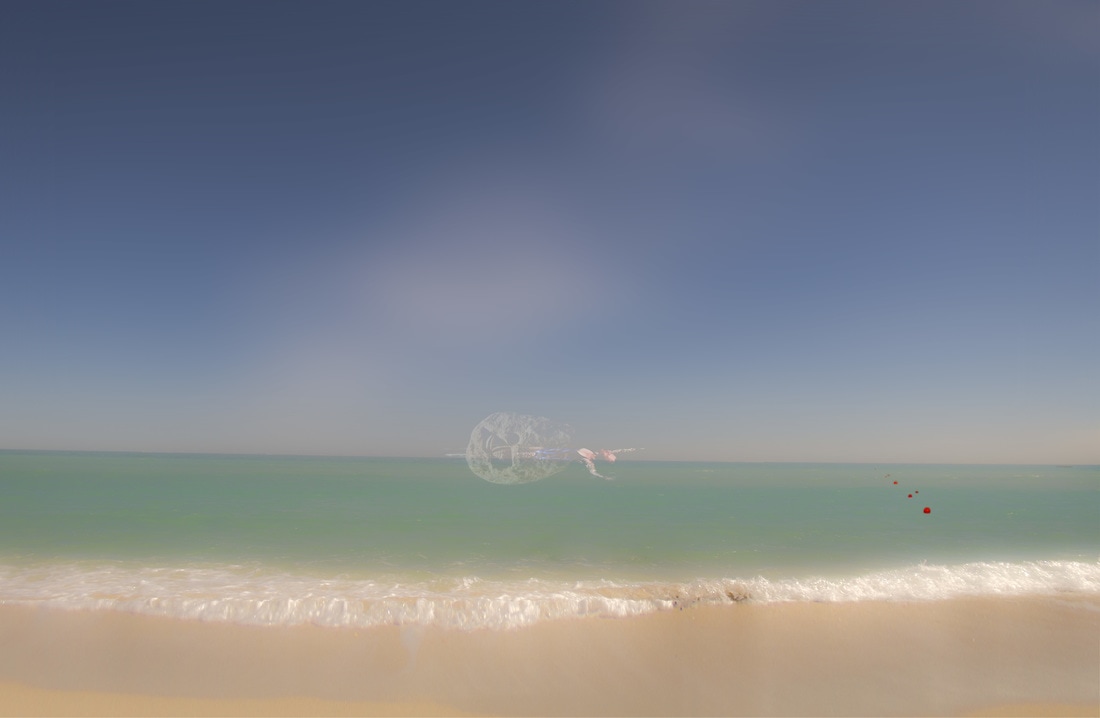|
I've been waiting for the official announcement so that I can make my own - "official" might be an overstatement, but public it now is: I have a piece selected to wrap a bus shelter in Seattle!
The City Panorama 2016 competition was hosted last winter by Photographic Center Northwest and King County, and my piece was selected as one of 110 out of 1500 competitors! The announcement was kind of quiet, but the list of finalists is at the bottom of the call itself. Here's the piece they selected. It's 8' x 2', and I call it Slocan Skipping Stones; it's of Loïc skipping stones on Slocan Lake when we camped there one summer. It's wrapping a bus shelter at 3rd & Union, right in downtown Seattle. So, go take a bus!
0 Comments
It’s early. It’s already poured. She’s on the sand at North Beach, and about to swim. The sun is just now breaking out from behind the yellow and black clouds that have been stacked in the eastern sky since dawn, swollen bruises dissipating into fine pinkening streaks. The air is still thick from the early rain, and now too dissipating in the breeze, that ever-present lift promising something soothing, its soft balm reaching the soul with its merciful cool. So often without cloud cover to temper the heat, something else has to. Two pelicans are fishing, flying fast against the wind and suddenly diving into the sea for its fruit. There are others here too at this early hour—in fact quite a few: solo swimmers; early-bird lovers walking along the watermark where sand is sea; kids who might have slept the night on the beach and who have just woken to this splendor; a granddad tugging lightly at his line in the water, teaching his grandson about fishing; a jogger running backwards; a man standing alone with his hands clasped behind his back as he watches the low lapping tide. One of the kids has walked into the ocean where there’s a sandbar close to shore, and he looks like he’s walking on water. Metaphor is everywhere, she thinks—the grand dramas of life at hand and underfoot in most every gesture, if you look closely. She leaves this afternoon, with no idea what comes next. For now, she’s the solitary woman who sits at the tideline facing the coming day, writing on the dampened pages of her notebook. Six red buoys bob in the surf to her south, and she remembers them from last time; she’s used them in her art, a photo piece about her broken heart and longing. She’s never told anyone how scared she is, probably because the fear is so strange that she can’t find the words. One buoy is much brighter than the others, maybe the oldest and lightened from the sun, or the newest and its colour still fully saturated. They flash against the cyan water, vibrant surprises that reveal themselves as the waves surge and fall. She gets in the water, and with shallow strokes moves over the sandbar, swimming away from shore toward the horizon where she’s been watching the coming of the day. She rolls onto her back, and with her limbs flung wide, floating, she’s half on top of the world and half beneath its surface. She opens her eyes, and past the tips of her toes she sees the darkening skies in the west, large clouds gathering fast in greys from smoke to ash, and she hears the boom and clap of thunder coming from inside them. She keeps an eye fixed on the west, watching for lightening while the eastern sun warms the top of her head as she floats. She flips over and paddles further. She gets out far, far enough to find herself in deep water; but the wonder she thinks, and that no one can see, is that her feet are still touching ground, her toes tucked into the fine soft sand, the rippled ocean floor slightly shifting shape as the waves roll around her above. Since arriving three weeks ago, this gentle exfoliant has removed the rough parts of her soles, healing other cracks and blemishes that have been part of her for so long too. As she comes back toward shore, she stands up and walks through the moving tide. She feels something under foot and reaches down for it. In her hand she holds a piece of oolite, a porous fossil-like thing, smooth and primitive at the same time. Made up of such things as minerals and coral and flint and clay. Some call it terrestrial detritus, which offers her some relief in her decision to claim it as her own, feeling like she’s rescuing something rejected, knowing she’ll love it with the tenderness one can have for the idea of home. She closes her fingers around this strange piece of soluble rock, but its misshapen form is slightly bigger than her palm, and so she can only cup it in an loose hold; and there, between her fingers, she notices two little mollusks nestled together inside a large pore that burrows into the center of this strange orb. They're both open. She comes back to land with the little piece of sand and sea in her hand--a solid imperfect globe, a small and perfect world for two. |
authorzoe welch Categories
All
November 2022
|


 RSS Feed
RSS Feed